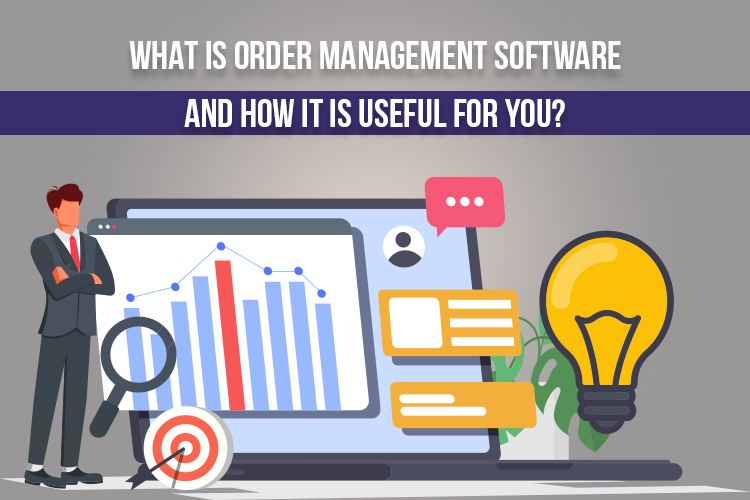Discover How AI is Revolutionizing Journey & CX in Sales & Support
Limited Seats!

Did you know 55% of retailers are still using pen and paper to manage their orders? This often leads to mismanagement, inaccuracies, and confusion. However, every business wants to grow, whether a small, mid, or giant company. It becomes tough to manage sales, especially if you are working on multiple platforms.
An order management software can be a one-stop solution for every order management issue; it helps to manage multiple sales channels, including brick-and-mortar locations, websites, call centers, mobile orders, kiosks, and more.
Also, it is beneficial from the customers’ standpoints as well. It simplifies the ordering process and provides a seamless and hassle-free experience to the customers.
In simple words, an Order Management System is a platform that helps to manage and track sales, orders, inventory, and fulfillment of the business. Additionally, it can automate lengthy processes. An OMS enables the people, processes, and partnerships necessary for products to find their way to the customers who bought them.
To stretch it, we can say that once the customer places the order, the order management system (OMS) comes into play. It helps in accepting, processing, billing, packaging, and dispatching orders. The system also helps to monitor inventory and sales growth.
An order management system works at every touch-point in nearly every facet of how your business operates, including:
Key Takeaways
An Order Management System is an effective platform for businesses to efficiently manage orders and automate many steps that previously needed manual involvement. This drastically improves companies with performance ability to process orders efficiently and quickly. Also, it can increase and enhance customer satisfaction and enhance your cash flow and profitability.
It is crucial to use OMS for an eCommerce seller because it becomes tough to manage sales and inventory without any OMS as the platform grows. Also, eCommerce platforms are rapidly growing, and an OMS helps in two ways:
These days customers want a hassle-free experience when they order online or even offline. Companies have to provide fast and easy shipping and returns to make this journey hassle-free. Also, they want transparent shipping status to track their order by tracking the ID given to them.
These are the main objectives of a good OMS to streamline and simplify the order process to ensure transparency through the entire order lifecycle.
An order management system combines computer software, online tools, and team processes that can remove confusion and bottlenecks through the ordering process.
An OMS works to:
Each order management system works a little differently depending on your business needs, but the main motive is to make the customer experience as easy as possible.
Establish touch-points at every step of the ordering process
Effective order management relies on a multi-dimensional system that controls all components of the online sales process, including:
In this way, you can determine when a visitor converted into a customer. On the other hand, your customer will experience a fast, efficient, affordable, and friendly experience.
Earlier, companies used to manage orders in many varieties of ways, from keeping an account with a notebook and pen to a spreadsheet on a computer. These days order management systems have become much more complex, efficient, and useful.
A company may purchase the OMS software as a separate module that is not integrated with any other business area. However, you can use it by integrating OMS with other software modules so that you can have all data in one digital place, and it will become more powerful for your business.
By integrating the OSM software, you can get customer relationship management, supply chain, finance, and other business software. Not only does this provide more automation, but it also produces more reliable reports and shows how different aspects of order management impact your bottom line.
It is a faster and a bit easier option; also, there are pretty affordable options in cloud-based options, and you have to pay as you grow. Cloud-based OMS gives you the flexibility to access from anywhere in the world, and you need an internet connection and a browser or a mobile app. Additionally, the vendor will handle and maintain the platform, which means a superior UX and better reliability.
The OMS can help your business to grow. It allows you to find out where your supply chain is getting bottlenecked. Sometimes companies can skyrocket your business growth with faster order fulfillment. Below, we have mentioned some other benefits of an OMS that help your business optimize satisfaction across all channels, decrease labor costs, and improve sales and margins.
You can get a better idea about your sales which means you can predict the demand, and according to them, you can manage your inventory. This way, your inventory will not take a long time in your warehouse, and your customer will also be happy with the freshness of the product.
As you embed an order management system in your business, your requirements for individual data entry will reduce because the same information can be used across all areas of the sales and fulfillment process provided through an OSM. When less data entry is required, it automatically decreases the chances of errors.
Every concerned person in the organization can track every order and check the order status; it helps strengthen customer service. Additionally, customers can also track their orders with the help of an OSM.
You can get all the potential information in the OSM dashboard; it can also tell you your supply chain’s weak and strong points. Also, you can track sales patterns, track KPIs, and forecast sales.
We have already mentioned how your business can be benefited if you implement an OMS in your business. Still, there are some challenges that a company has to go through if things don’t get implemented properly. We have mentioned those hurdles and advice on how to address them.
An OMS platform works excellent when implemented with other programs available in the ecosystem. Suppose you do not connect your OMS system with other areas of your business, such as the Challenges of an Order Management System. In that case, you’ll miss some critical information and opportunities that can grow your business very efficiently. ;
Sometimes people choose the wrong OMS platform for their business that lacks some critical features such as monitoring inventory levels, process returns, and more.
Also, there are some prospective features as well. Like, as the ability to generate reports in a simple-to-understand format, and easy understanding of the dashboard to see KPIs at a glance. Also, OMS should provide deeper data of any particular customer, such as order history.
Additionally, the program should be laced with POS integration, a strong customer support team, and the ability to triage orders for shipping and in-store pickup.
Configuration of your OMS is significant for your employees involved at different stages of the customer lifecycle. Giving your employees access to data, reports, and information should be customized so that precious customer data can be kept safe and employees still get the tools to do their jobs properly.
Whether you are a single-channel company or a multi-channel company, you can benefit from the structure provided with an OMS. Enhancing the entire purchase journey can drastically increase sales and customer experience. Below all the steps are mentioned, an OMS can manage that:
Online retailers can grow their business by boosting efficiency by getting all the essential processes accessed into one digital space with an OMS. OMS platform can also open online sales doors that might have been previously closed to e-commerce companies. Instead of receiving orders just for your website, you can open purchases to third-party retailers like Amazon and Flipkart, as well as other platforms like social media. The best part is that all those orders and inventory can be managed just from one place.
Choosing an OMS that suits your business needs is a bit of a hard task. It is a crucial part of any business that manages the order life cycle, from the moment a customer places an order to delivery and even post-sales service.
Below we have added some steps to follow to ensure your OMS meets your company’s needs.
First, you have to think about your company’s future sales growth and requirements. What are the expectations about expansion, increasing order volumes, and expanding sales channels.
There are some prime features that your OMS should include:
Connectivity is an important aspect to consider that includes your company’s eCommerce website and ERP system. By integrating programs with each other, you can reduce the manual inputs and minimize errors.
These depend on company to company; cloud-based OMS doesn’t require hardware or software maintenance. On the other hand, on-premises OMS is for those who want to host and manage their systems.
India’s one of the best software development companies, SAN Softwares, also has an order management software called SanORDO. This software can keep track of all orders as well as manage the people, processes, and relationships with the customer. The main goal of SanORDO is to streamline and automate order processing.
It can handle everything a business needs to process an order, such as inventory information, a vendor database, a customer database, a record of customer returns and refunds, invoicing and payment information, order processing records, and general ledger information.
This software is best for bulk order processing where the business has to process thousands of orders every day like Teleshopping or any Ayurveda company. This kind of business especially needs the support of call tracking and providing the status of client orders on call.
SanORDO is the best inventory management software for eCommerce and teleshopping businesses. It helps improve sales visibility, customer interactions, and quick order processing.
There are tons of features that have been in San Softwares’ SanORDO order management system; below, we have added a few crucial features on an OMS:
The user gets all accounting, inventory, and customer data in one easy-to-understand dashboard for efficient working. You can track business and sales more efficiently from one place, and your team will be able to do the same.
Making the business more efficient is one of the essential tasks; with SanORDO, you can save man-hours and lower labor expenses. Ultimately, this will make the company more efficient and open new ways to grow.
With multi-channel integration and standard order process for business. You get enough data to evaluate to make more robust customer relationships and predict sales more accurately.
Once a business has installed SanORDO, the chances of manual error get eliminated and decrease the chances of any accuracy in inventory management.
Post-sales follow-up is an essential task for any OMS to maintain customer relationships. SanORDO helps you maintain this relationship by sending follow-up emails asking how they liked the items and checking that they received everything they ordered.
SanORDO allows you to monitor your business from your phone, laptop, or PC at any time and from anywhere. Also, from the customers’ end, the platform allows purchasing from any location with more data control and faster order procession.

SAN Softwares is a company dedicated to providing complete software solutions to Corporate and end-user customers.
